Cory Michael Smith Was Meant to Play Varian Fry

- Oops!Something went wrong.Please try again later.
- Oops!Something went wrong.Please try again later.
"Hearst Magazines and Yahoo may earn commission or revenue on some items through these links."
There's a scene in episode two of Transatlantic that will stay with you long after you watch: Varian Fry, played by Cory Michael Smith, is sitting behind a desk, as a long line of desperate refugees wait to speak with him. He takes notes on each person as they tell him their story. They ask, Can you help me? Please help me. I need somewhere safe. I need to leave. Fry, in the face of this immense horror, has to then ask them: "Are you a professional artist, politician, or published academic?" He has to tell these refugees over and over again, "I don't think we can help you." After one conversation, he excuses himself, and leaves his office visibly upset, shaken by the enormity of his task.
Varian Fry is one of those historical figures where once you learn his story, you'll want everyone else to know it, too.
Smith brings Varian Fry to vivid life in Transatlantic, a new Netflix period drama out today about Fry's time in Marseille in 1940, which is based on the historical fiction novel The Flight Portfolio by Julie Orringer. When Smith joined the cast, he dove headfirst into research. He has played a few historical figures before, like a small role in First Man as NASA astronaut Roger Chaffee, but has spent his career mainly playing fictional characters, like Edward Nygma/the Riddler in the TV show Gotham, or a queer man, Adrian, dying of AIDS in the independent film 1985.
Transatlantic marks the first time he had a lead role based on a real person, an experience he found to be an exciting challenge. "Varian is not someone where there's audio or video, so I didn't feel the burden of imitating someone. It was really trying to learn this person, their past, their motivations, and apply it to this story. It felt like a really exciting task," he tells Town & Country over Zoom ahead of the show's premiere. Smith says he surprised himself with his enthusiasm for studying the facts and the history of Fry, but had to pull himself out of the history to focus on the emotions at hand.
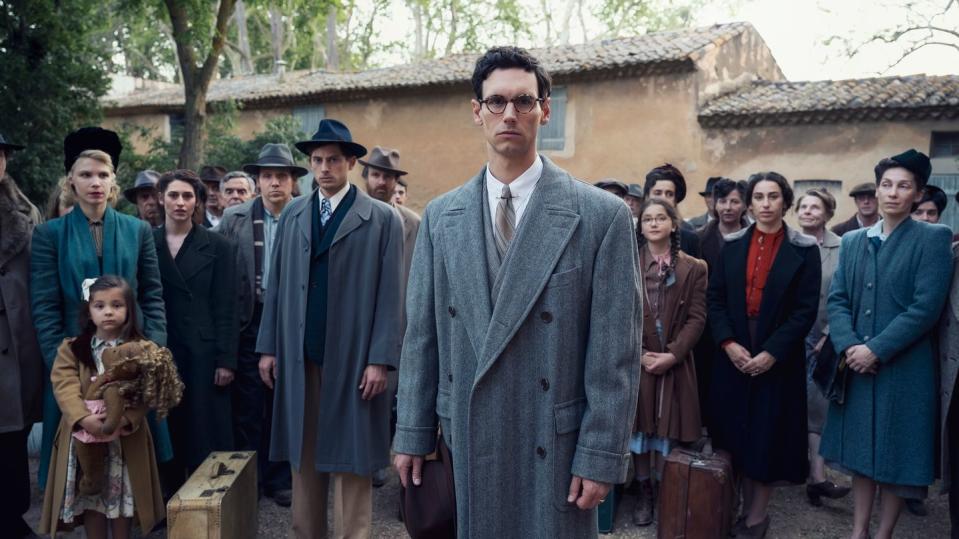
It's understandable how Smith fell into the history, because it's such an unbelievable story. In 1933, Fry, an American journalist, was in Berlin to report on the rise of Adolf Hitler and Nazism. In one dispatch of an antisemitic riot in Berlin for the New York Times, Fry wrote, "Nowhere did the police seem to make any effort whatever to save the victims from this brutality." Seven years later, Fry would return to Europe with the Emergency Rescue Committee (ERC), a group dedicated to aiding anti-Nazi writers and artists (both Jews and non-Jews) who were fleeing the persecution of the Nazi regime. Fry volunteered to be the ERC's representative in France, and for 13 months spanning 1940 and 1941, he worked tirelessly—using legal and illegal means—to aid refugees fleeing the occupation. He and his associates, including Chicago heiress Mary Jayne Gold and American art student Miriam Davenport, ultimately helped around 2,000 people escape, including Marc Chagall, Hannah Arendt, Max Ernst, Marcel Duchamp, and so many more.
There's an ethical dilemma at the heart of Fry's mission with the ERC, which goes back to the question the fictional Fry asks refugees (are you a professional artist, politician, or published academic?) in the show: Who was deemed worthy of saving? And how do you handle being the one who decides that?
The aforementioned scene is one of Smith's favorites, as Fry, he had to convey the mix of kindness and desire to help but inability to do anything. His character was "dealing with the sort of classism of saying 'we're really only here to help people on a scale of meritocracy' while you have all of these other people who are just desperate to leave," Smith says. "Trying to get that right—that moment of trying to do his job, feeling great guilt over that, and it being an untenable thing for him to continue doing and having to excuse himself, felt really important in showing Varian's humanity and his sensitivity to what he was doing." He continues, "He was trying to do the right thing, but not sure."
To prepare to play Fry, Smith spent time at Columbia University's Rare Books & Manuscript Library, reading his work, journals, and correspondence from his time in Marseille, among other materials. "It really rocketed me into it," he says. "There's something amazing about holding a letter from Eleanor Roosevelt." Once Fry committed to going to France, too, "you could read a thrill in his letters to the State Department. There wasn't a trepidation in his writing. There was an eagerness and assuredness that I found really fascinating." Transatlantic creator Anna Winger tells T&C that Smith really "met her halfway" on the research process for Fry, and the two would trade readings as they worked to develop his storyline.
When Fry decided to go to Marseille with the ERC, Smith says, "I got this sense that he found this feeling of intense purpose, suddenly. Intense responsibility and righteousness—I just could feel it. It was really helpful for me, being propelled into it to constantly have this thing of, 'I'm in charge. I have responsibility. I'm here.' And sometimes be like emotionally aroused by like the thrill of it and the danger of it, and then quickly stifling that with the reality of the weight of it and the fear of it and the danger of the thing."

The Flight Portfolio: A novel (Vintage Contemporaries)
$16.95
amazon.com
But Smith pulled himself out of the history when he read Julie Orringer's The Flight Portfolio. "I was getting caught up in the skeleton of his life and his timeline," the actor says. "Julie's prose reminded me that of the humanity of all of it. There are moments where he's touching this man and she's talking about the physical sensation that happens to your body when you are touched by someone that you're attracted to, or lusting after."
The book, Smith says, reminded him that "amidst the enormity of this task at hand and this story and this responsibility, the actual like nerve minutia of every moment is the thing that I'm actually responsible for. I was getting lost in the story because it's really astounding that this person did this, but it was a nice reminder to do my job of taking every single moment step by step." He adds, "the story in itself was just sort of overwhelming and the job of playing this man was overwhelming."
Smith, however, rose to the challenge—and delivered. Though he won't admit it, he channeled Fry on production in Marseille, taking a leadership role behind-the-scenes amongst the international cast. (All he'll say: "I tried to make sure the morale was up and people felt good about what was happening.")
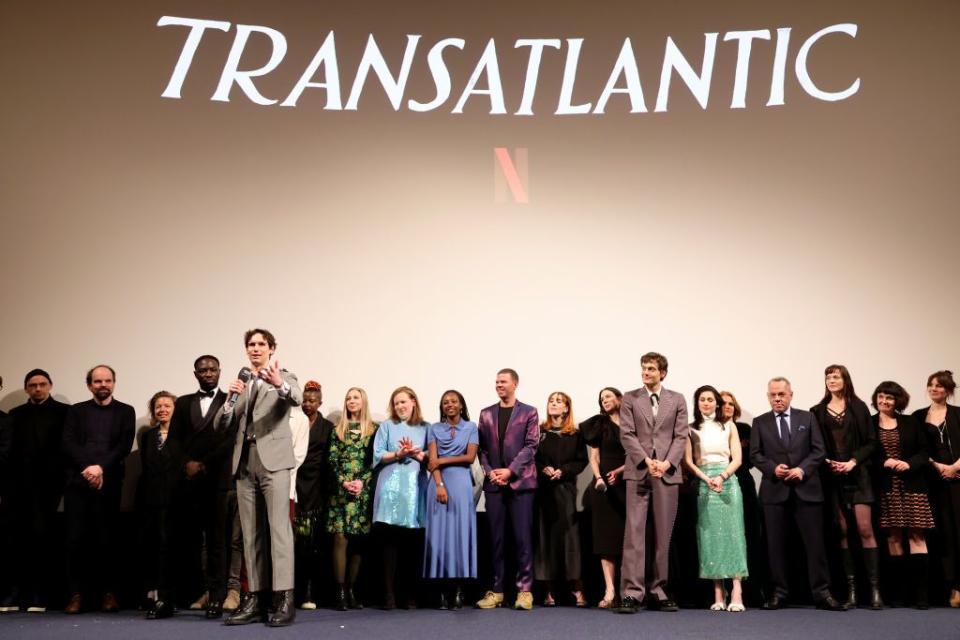
"The thing about Cory Michael Smith is he really is the heart and soul of the show," creator Anna Winger tells Town & Country. "He is like Varian. He's the one who walks the ladies home after dinner and makes sure everybody's okay. He's bringing everyone together. He is the light in the room. He's an insanely talented person in every way."
His costar, Gillian Jacobs, is similarly effusive in her praise of Smith. "He is an incredibly smart person and actor. He had done a tremendous amount of research, and was thoroughly prepared—it's just a piece of perfect casting. I just felt like Anna just cast the perfect actor for the role. And so it just made all of it so easy for me," Jacobs says.
Jacobs adds that she found Smith's performance "incredibly inspiring," and felt herself slipping into a similar dynamic with Smith as the one that existed between Fry and her character, Mary Jayne Gold, a heiress who works with the ERC: "kinda in awe of him, slightly intimidated, wanting him to respect me," she jokes.
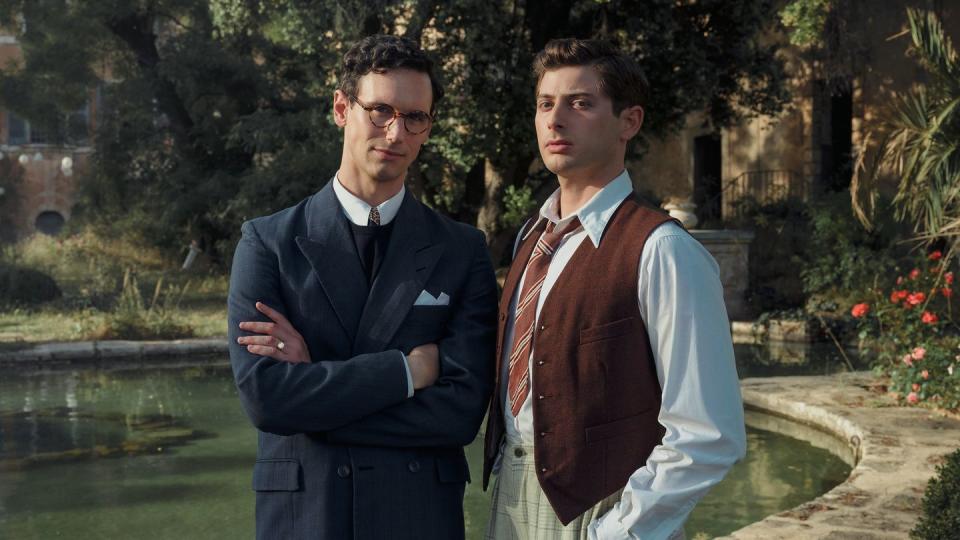
In Transatlantic, the story doesn't just grapple with the moral weight of what Fry was doing in occupied France, but examines the struggles happening in his inner life. He was a closeted queer man, though Smith doesn't know what label to place on him. "To call him a gay man is not maybe not accurate to his experience," he says. "He was married to two women and had three children, though he has multiple relationships with men that are well documented from other men, not from him. To pretend like this person wasn't with men is a lie."
When Orringer's novel came out, there was backlash that she crafted a fictional romantic plotline for Fry. Cynthia Ozick, in a largely positive review in the New York Times, criticized it specifically, arguing there was no evidence of his queerness. In a letter to the editor in response, Fry's son James rejects her critique. He wrote, "I am the son of Varian Fry, about whom Cynthia Ozick writes: 'For the historical Fry, beyond hunches and hints, there is no evidence of homosexuality.' She goes on to suggest that the subplot of Julie Orringer’s novel involving homoerotic love will somehow aid the cause of Holocaust denialists. Regarding the first point: My father was indeed a closeted homosexual. I figured this out as a young man, after my father had died, from many clues, most of which have never been available to researchers. Regarding the second point: I fail to see how my father’s homosexuality could muddy the moral clarity of his cause or besmirch his reputation."
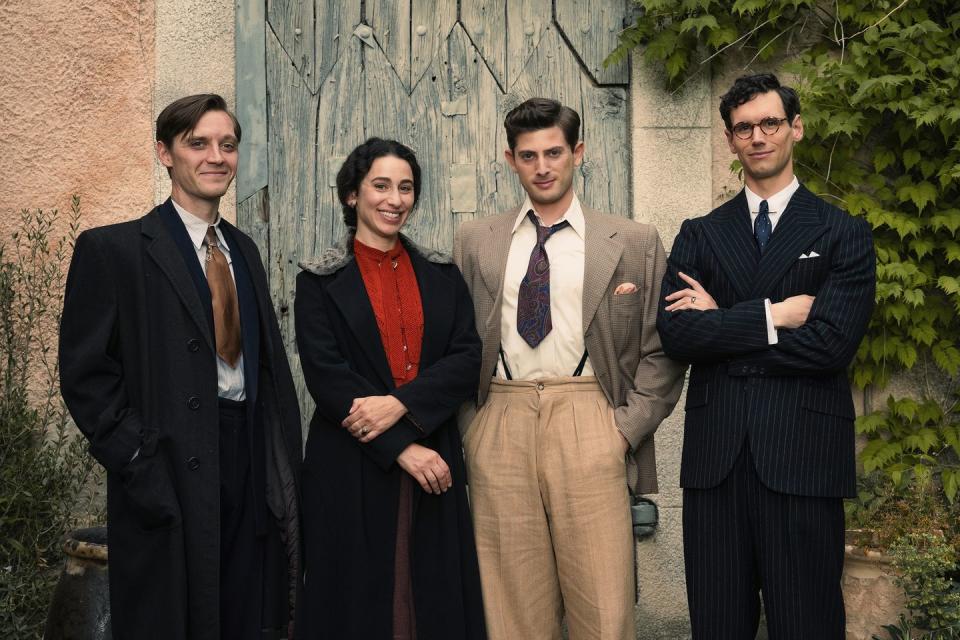
Like in the novel, romance is a key part of Transatlantic's tale—Fry's relationship with Thomas (played by Amit Rahav, of Unorthodox fame, another Anna Winger Netflix show) weaves throughout each episode. Smith says he was drawn to portray Fry in this project not just because of the plot of the ERC—but because of Fry's struggle with his sexuality. "It is a man up against the trends of society," he says. "His story being fighting against both what the Gestapo is doing and the ambivalence, or the apathy, of his government. He's fighting against these powers, and he's also fighting against this societal power against sexuality. That someone's personal, emotional, romantic experience is illegal is just so insane. I felt those things compounding on each other really tells a story of how brave Varian can be, and succeeding against one and failing in the other, arguably."
These two conflicts mirror each other throughout the seven episode miniseries. On one level, Fry is someone "who is feels a sort of righteousness to do what he feels is just and to help these people who are massively suffering at the hands of a tyrant, at a time when his government and his society is not enthusiastic about helping these people," Smith says. On another, he is "making a decision about whether he does something that feels righteous and true to him, or whether he is beholden to society's strictures and opinions."
This storyline has particular resonance for the current political climate, with a dramatic rise in attacks on LGBTQ rights—in the first two months of 2023 alone, 385 anti-LGBTQ laws were introduced at the state level, more than the past five years combined, according to the ACLU. "We're seeing an extreme right wing culture of vilifying trans people to try to make it illegal for someone to have the freedom and personal liberty to live their life as they wish—with their bodily autonomy and their own sexual identity," Smith says. Fry, while not trans, struggled to live freely in his sexual identity.
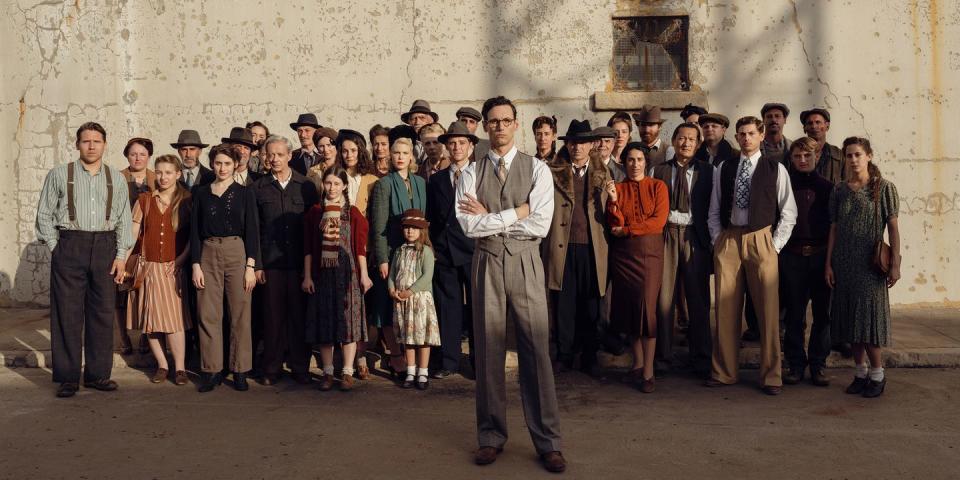
Throughout our conversation, Smith, humble and reluctant to share much about himself, instead much more comfortable about talking about Varian Fry, the character, does get personal for a moment. "I'm a fairly sensitive guy and I love my job so much because I feel really attached to these people—they continue to live in me. There are certain characters that just harbor in my body and my nervous system. They're just there," he says. "I have a very deep attachment to this character and this show. It still lives very fully in my body, all of this."
Transatlantic is now streaming on Netflix.
You Might Also Like

